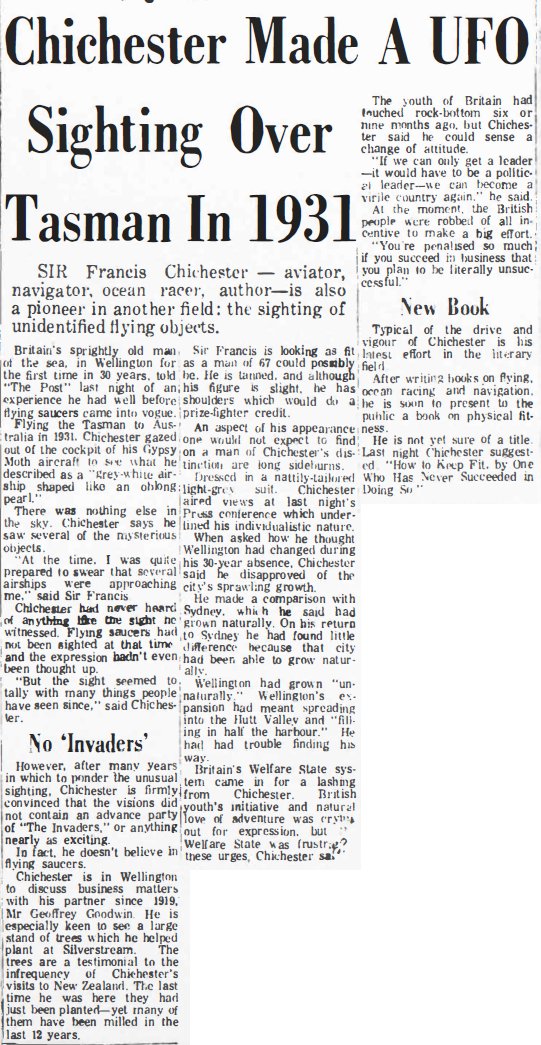The article below was published in the daily newspaper The Evening Post, Wellington, New Zealand, on May 9, 1968.
See the case file.

|
SIR Francis Chichester - aviator, navigator, ocean racer, author - is also a pioneer in another field: the sighting of unidentified flying objects.
Britain's sprightly old man of the sea, in Wellington for the first time in 30 years, told "The Post" last night of an experience he had well before flying saucers came into vogue.
Flying the Tasman to Australia in 1931, Chichester gazed out of the cockpit of his Gypsy Moth aircraft to see what he described as a "grey-white airship shaped into an oblong pearl."
There was nothing else in the sky. Chichester says he saw several of the mysterious objects.
"At the time, I was quite prepared to swear that several airships were approaching me," said Sir Francis.
Chichester had never heard of anything like the sight he witnessed. Flying saucers had not been sighted at that time and the expression hadn't even been thought up.
"But the sight seemed to tally with many things people have seen since," said Chichester.
However, after many years in which to ponder the unusual sighting, Chichester is firmly convinced that the visions did not contain any advance party of "The Invaders," or anything nearly as exciting.
In fact, he doesn't believe in flying saucers.
Chichester is in Wellington to discuss business matters with his partner since 1919, Mr. Geoffrey Goodwin. He is especially keen to see a large stand of trees which he helped plant at Silverstream. The trees are a testimonial to the infrequency of Chichester's visit to New Zealand. The last time he was there they had just been planted - yet many of them have been milled in the last 12 years.
Sir Francis is looking as fit a man of 67 could possibly be. He is tanned, and although his figure is slight, he has shoulders which would do a prize-fighter credit.
An aspect of his appearance one would not expect to find on a man of Chichester's distinction are long sideburns.
Dressed in a nattily-tailored light-grey suit, Chichester aired views at last night's Press conference which underlined his individualistic nature.
When asked how he thought Wellington has changed during his 30-years absence, Chichester said he disapproved of the city's sprawling growth.
He made a comparison with Sydney, which he said had grown naturally. On his return to Sydney he had found little difference because that city had been able to grow naturally.
Wellington had grown "unnaturally." Wellington's expansion had meant spreading into the Hutt Valley and "filling in half the harbour." He had trouble finding his way.
Britain's Welfare State system came in for a lashing from Chichester, British youth's initiative and natural love of adventure was crying out for expression, but the Welfare State was frustrating these urges, Chichester said.
The youth of Britain had touched rock-bottom six or nine months ago, but Chichester said he could sense a change of attitude.
"If we can only get a leader - it would have to be a political leader - we can become a virile country again," he said.
At the moment, the British people were robbed of all incentive to make a big effort.
"You're penalized so much if you succeed in business that you plan to be literally unsuccessful."
Typical of the drive and vigour of Chichester is his latest effort in the literary field.
After writing books on flying, ocean racing and navigation, he is soon to present to the public a book on physical fitness.
He is not yet sure of a title. Last night Chichester suggested "How to Keep Fit, by One Who Has Never Succeeded in Doing So."